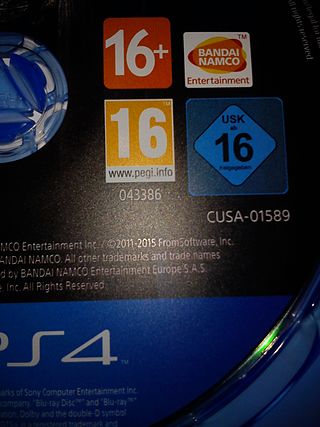Related Research Articles
A motion picture content rating system classifies films based on their suitability for audiences due to their treatment of issues such as sex, violence, or substance abuse, their use of profanity, or other matters typically deemed unsuitable for children or adolescents. Most countries have some form of rating system that issues determinations variously known as certifications, classifications, certificates, or ratings. Age recommendations, of either an advisory or restrictive capacity, are often applied in lieu of censorship; in some jurisdictions movie theaters may have a legal obligation to enforce restrictive ratings.

The Entertainment Software Rating Board (ESRB) is a self-regulatory organization that assigns age and content ratings to consumer video games in the United States and Canada. The ESRB was established in 1994 by the Entertainment Software Association, in response to criticism of controversial video games with excessively violent or sexual content, particularly after the 1993 congressional hearings following the releases of Mortal Kombat and Night Trap for home consoles and Doom for home computers. The industry, pressured with potential government oversight of video game ratings from these hearings, established both the IDSA and the ESRB within it to create a voluntary rating system based on the Motion Picture Association of America film rating system with additional considerations for video game interactivity.

The Video Recordings Act 1984 is an Act of the Parliament of the United Kingdom that was passed in 1984. It states that commercial video recordings offered for sale or for hire within the UK must carry a classification that has been agreed upon by an authority designated by the Home Office. The British Board of Film Classification (BBFC), which had been instrumental in the certification of motion pictures since 1912, was designated as the classifying authority in 1985. Works are classified by the BBFC under an age-rated system ; it is an offence under the Act to supply video works to individuals who are under the age of the classification designated. Works that are refused classification cannot, under the Act, be legally sold or supplied to anyone of any age unless it is educational, or to do with a sport, religion or music and does not depict violence, sex or incite a criminal offence. The BBFC may also require cuts to be made, either to receive a certain age rating, or to be allowed a classification at all.
In video games, censorship are efforts by an authority to limit access, censor content, or regulate video games or specific video games due to the nature of their content. Some countries will do this to protect younger audiences from inappropriate content using rating systems such as the ESRB rating system. Others will do this to censor any negative outlook on a nation's government.

PEGI, short for Pan-European Game Information, is a European video game content rating system established to help European consumers make informed decisions when buying video games or apps through the use of age recommendations and content descriptors. It was developed by the Interactive Software Federation of Europe (ISFE) and came into use in April 2003, replacing many national age rating systems with a single European system. The PEGI system is now used in 41 countries and is based on a code of conduct, a set of rules to which every publisher using the PEGI system is contractually committed. PEGI self-regulation is composed by five age categories and nine content descriptors that advise the suitability of a game for a certain age range based on the game's content. The age rating is not intended to indicate the difficulty of the game or the skill required to play it.

The Irish Film Classification Office (IFCO) is the organisation responsible for films, television programmes, and some video game classification and censorship within Ireland. Where restrictions are placed by the IFCO, they are legally binding.
Unterhaltungssoftware Selbstkontrolle is the organisation responsible for video game ratings in Germany. In Austria, it is mandatory in the state of Salzburg, while PEGI is mandatory in Vienna.
A regulatory agency or independent agency is a government authority that is responsible for exercising autonomous dominion over some area of human activity in a licensing and regulating capacity.
A content rating rates the suitability of TV shows, movies, comic books, or video games to this primary targeted audience. A content rating usually places a media source into one of a number of different categories, to show which age group is suitable to view media and entertainment. The individual categories include the stated age groups within the category, along with all ages greater than the ages of that category.

A video game content rating system is a system used for the classification of video games based on suitability for target audiences. Most of these systems are associated with and/or sponsored by a government, and are sometimes part of the local motion picture rating system. The utility of such ratings has been called into question by studies that publish findings such as 90% of teenagers claim that their parents "never" check the ratings before allowing them to rent or buy video games, and as such, calls have been made to "fix" the existing rating systems. Video game content rating systems can be used as the basis for laws that cover the sales of video games to minors, such as in Australia. Rating checking and approval is part of the game localization when they are being prepared for their distribution in other countries or locales. These rating systems have also been used to voluntarily restrict sales of certain video games by stores, such as the German retailer Galeria Kaufhof's removal of all video games rated 18+ by the USK following the Winnenden school shooting.

Netherlands Institute for the Classification of Audiovisual Media is the institute responsible for the content given for review for the Dutch motion picture rating system, Kijkwijzer, and the software given for review for the European video game content rating system PEGI.

British Board of Film Classification is a non-governmental organisation founded by the British film industry in 1912 and responsible for the national classification and censorship of films exhibited at cinemas and video works released on physical media within the United Kingdom. It has a statutory requirement to classify all video works released on VHS, DVD, Blu-ray, and, to a lesser extent, some video games under the Video Recordings Act 1984. The BBFC was also the designated regulator for the UK age-verification scheme, which was abandoned before being implemented.
The United Kingdom has the largest video game sector in Europe. By revenue, the UK had the second largest video game market in Europe in 2022 after Germany, and the sixth largest globally. By sales, it is Europe's largest market, having overtaken Germany in 2022. The UK video game market was worth £7.16 billion in 2021, a 2% increase over the previous year.
Brown v. Entertainment Merchants Association, 564 U.S. 786 (2011), was a landmark decision of the US Supreme Court that struck down a 2005 California law banning the sale of certain violent video games to children without parental supervision. In a 7–2 decision, the Court affirmed the lower court decisions and nullified the law, ruling that video games were protected speech under the First Amendment as other forms of media.
Video game development is a developing industry in the Republic of Ireland, with some government attempts made to encourage investment via tax breaks. Of the approximately €206 million spent by Irish people on video games in 2015, Irish game developers "[saw] little of this spend".

The International Age Rating Coalition (IARC) is an initiative aimed at streamlining acquisition of content ratings for video games, from authorities of different countries. Introduced in 2013, the IARC system simplifies the process of obtaining ratings by developers, through the use of questionnaires, which assess the content of the product. This new process reduces the costs of video game developers as they seek to obtain ratings for their products that are distributed digitally online.

In video games, a loot box is a consumable virtual item which can be redeemed to receive a randomised selection of further virtual items, or loot, ranging from simple customization options for a player's avatar or character to game-changing equipment such as weapons and armor. A loot box is typically a form of monetisation, with players either buying the boxes directly or receiving the boxes during play and later buying "keys" with which to redeem them. These systems may also be known as gacha and integrated into gacha games.

The Association for UK Interactive Entertainment (Ukie) is a non-profit trade association for the video game industry in the United Kingdom (UK). Ukie was founded in 1989 as the European Leisure Software Publishers Association (ELSPA), then changed to Entertainment and Leisure Software Publishers Association (ELSPA) in 2002, and to its current name in 2010.

The Chilean video game content rating system, is a set of decrees that regulate the video game rating for video games sold in Chile since 2018. Chile and Brazil are the only countries in South America to officially adopt a video game content rating system other than the ESRB.
References
- ↑ "Video Standards Council to take over games age ratings". BBC News. 10 May 2012. Retrieved 2 February 2014.
- ↑ "VSC - ParentPort". www.parentport.org.uk. Archived from the original on 3 July 2020. Retrieved 17 April 2017.
- ↑ "Origins of the VSC". The Video Standards Council. Archived from the original on 19 April 2015. Retrieved 2 February 2014.
- ↑ "VSC - Our History". videostandards.org.uk. Retrieved 27 December 2022.
- ↑ "The Video Standards Council". videostandards.org.uk. Archived from the original on 20 December 2017. Retrieved 17 April 2017.
- ↑ "Just When You Were Getting Comfortable". Game Ratings UK. Retrieved 28 December 2018.
- ↑ "VSC renamed as Games Rating Authority". Games Rating Authority. Retrieved 9 August 2023.
- ↑ "Welcome to the Games Rating Authority". The Video Standards Council. Retrieved 2 February 2014.
- ↑ "Video Standards Council Releases Annual Report on UK Video Games Ratings". Game Politics. 23 July 2013. Retrieved 2 February 2014.